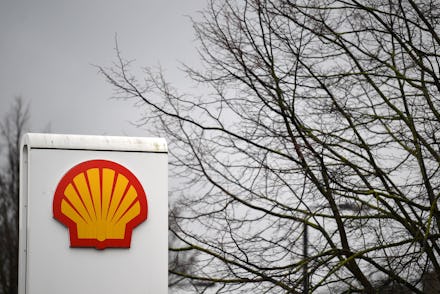Shell swears that its oil production will only decrease from now on

Last year, oil giant Shell announced that it would achieve net-zero carbon emissions by the year 2050. The easiest way for a fossil fuel company to make that shift is to simply stop drilling for, producing, and selling fossil fuel. Of course, Shell isn’t ready to do all that quite yet — but it did announce this week that it has reached its oil peak and expects to see its production continue to decrease every year from here on out.
According to the company, it actually reached peak oil production in 2019 and is planning to drop production by 1% or 2% annually going forward. Shell also said that its total carbon emissions peaked in 2018. The company is promising a concentrated effort to continue driving down those emissions, decreasing its carbon footprint by 45% by 2035 and eventually reaching net-zero status by 2050.
“We must give our customers the products and services they want and need — products that have the lowest environmental impact," Royal Dutch Shell CEO Ben van Beurden said in a statement. "At the same time, we will use our established strengths to build on our competitive portfolio as we make the transition to be a net-zero emissions business in step with society."
Shell's announcement is unquestionably a positive development, though it's hard not to view it as a cynical one. Sure, other oil companies like Exxon have brazenly announced that they will go ahead and increase pollution in the face of an increasingly dire climate crisis, but most of the oil industry sees the writing on the wall. Demand for oil has been on the decline for years now, and the coronavirus pandemic caused the market to temporarily bottom out, forcing companies to actually pay people to take on their oil reserves. The market has recovered somewhat, but experts warned that demand would never fully return and fossil fuel producers would likely face dire straits in the near future. Even BP has predicted that the world has passed peak oil and expects a 10% drop in demand by the end of the decade and a 50% drop-off by 2040.
So if you're a company like Shell — the sixth-largest contributor of greenhouse gases to the environment since the Industrial Revolution — there's no better time to start your shift away from the oil business. Some will surely give the company credit for being proactive and shifting its interests to alternative energy sources when there is still plenty of money to be made in oil production in the near-term. But the truth is something closer to Shell reading the tea leaves and determining that it will actually be more profitable to position itself as the oil company that is going green.
Shell's lone imperative is to make money. The company says as much in its statement, where it lays out its goals while shifting away from oil: "generating shareholder value, achieving net-zero emissions, powering lives and respecting nature." It's no accident that "generating shareholder value" comes first.
"Make no mistake, the damage Shell will cause with these ‘reduced’ production plans will be catastrophic."
It's also worth noting that while Shell may be shrinking its oil profile, that doesn't mean it is going green. The company said it would greatly expand its biofuel production, but biofuels can not only be just as bad for the planet as dirty-burning fossil fuels like coal or oil, but also contribute to deforestation and create food insecurity as farmland that could be used for more productive crops are dedicated to the fuel source instead. Shell is also planning to add millions of tons of new capacity for liquefied natural gas. While natural gas is considered the cleanest burning of the fossil fuels, that's the equivalent of being the best film to win a Razzie. Investing more in natural gas production, which produces massive methane leaks that may be just as bad for the planet as burning dirty fuel sources, also locks the world into a massive supply of a "middle ground" solution that still produces emissions at a time when we need to be rapidly shifting away from them altogether.
"Make no mistake, the damage Shell will cause with these ‘reduced’ production plans will be catastrophic," Kassie Siegel, director of the Center for Biological Diversity’s Climate Law Institute, tells Mic. "Nobody should be fooled by this weak, dishonest greenwashing. Shell continues to block climate progress at every turn. The real question is, when will our elected leaders start holding Shell and other perpetrators of climate crimes accountable for the damage done?"
Shell isn't entirely neglecting clean energy; the company is going to spend up to $3 billion on renewable energy sources in the "near term," it says, though it’s worth noting that is the same sum the company plans to spend on marketing. Meanwhile, Shell will continue pouring tens of billions of dollars into oil and other less-than-ideal fuel sources, even as it supposedly starts its shift to a cleaner future.
Give Shell credit: It’s living up to its name by basically playing a shell game, using a little sleight of hand to draw attention to its "green" shift while continuing to milk some of its worst practices for as long as it proves profitable.